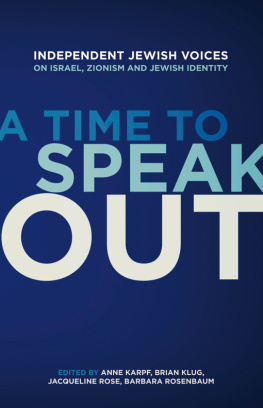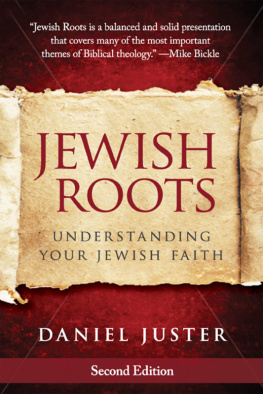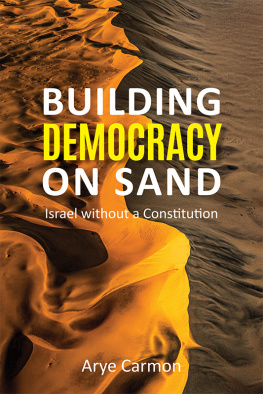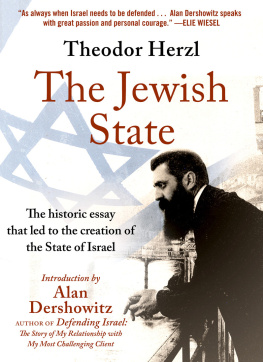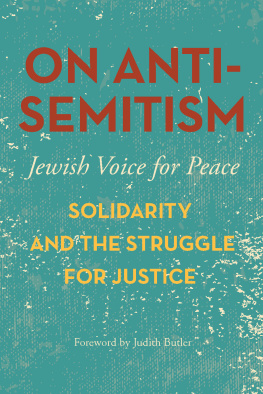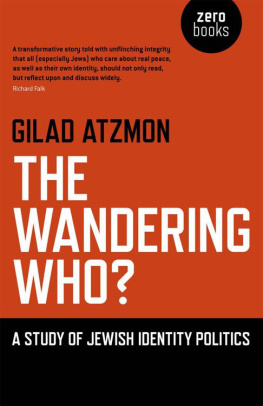A TIME TO SPEAK OUT
Independent Jewish Voices on Israel, Zionism and Jewish Identity
Edited by Anne Karpf, Brian Klug, Jacqueline Rose, Barbara Rosenbaum
V
VERSO
London New York
First published by Verso 2008
'" in the contributions to the individual authors 2008 in the selection and editorial matter Verso 2008 All rights reserved
The moral rights of the authors have been asserted
13579 10 8642
Verso
UK: 6 Meard Street, London W1F 0EG
USA: 20 Jay Street, 10th Floor, Brooklyn, NY 11201-8346 www.versobooks.com
Verso is the imprint of New Left Books
ISBN: 978-1-84467-229-5
British Library Cataloguing in Publication Data
A catalogue record for this book is available from the British Library
Library of Congress Cataloging-in-Publication Data
A catalog record for this book is available from the Library of Congress
Typeset in Sabon by Hewer Text UK Ltd, Edinburgh Printed in the USA by Maple Vail
Contents
Israel and Palestine
Lynne Segal Solidarity at a Distance and
Tony Klug Occupation, Human Rights
Stan Cohen The Virtual Reality of Israeli
Gillian Slovo South Africa and Israel:
The Climate of Debate
Anne Karpf The Arab Nazi and
D.D. Guttenplan Speaking Out: If Not Now,
vi A Time to Speak Out
Justice and Human Rights
Anthony Rudolf Paths of Peace: A Personal
Jeremy Montagu You Shall Not Follow a
Jewish Identity and Diversity
Julia Bard S elf-Determination in
Editors Introduction
This is a book of voices: independent voices that assert a variety of views on Israel and Zionism, individual voices that express diverse ideas of Jewish identity. Each essay reflects the views only of its author. Each is self-contained. But, without knowing it, the contributors address each other across the pages of the book. On the one hand, they are united by a shared commitment to justice and human rights. On the other hand, there are sharp differences among them. Even when they concur, they accentuate different points and offer different angles of approach. So, these voices do not so much comprise a choir, with everyone singing from the same hymnbook, as a lively and unpredictable town hall meeting. We editors, whose task has been to impose order on these unruly voices, have placed them in a certain sequence and divided the contents into four sections. But ultimately the book is a complex tangle of conversations that can be entered at almost any point: you are in the midst of them, whether you start at the beginning or dip in at random.
These conversations are contemporary. This is not to say that the topics are brand new. Jews have fiercely debated Zionism ever since the movement began in the late nineteenth century, and they have argued over Israel from the creation of the state sixty years ago in 1948. As for Jewish identity (what makes a Jew a Jew), this is a subject as old as the seven hills of Jerusalem, if not older. But there are periods when these questions and arguments subside, when they seem to matter less. Today they matter more. The situation in the Middle East could hardly be more grave, while the climate of debate in the Jewish world is acrimonious. That makes these conversations a current affair and a matter of urgency. This is no time for polite evasion. Too much is at stake for too many people. On this, at least, all the contributors agree: it is time to speak out.
Certain circumstances loom large in the background to this agreement. They include Israels continuing siege of Gaza, expanding Israeli settlement in the West Bank, systematic violations of human rights in the Palestinian territories, and the vicious cycle of violence against innocent civilians on all sides. Watching from afar, in Britain and elsewhere, more and more Jews are filled with dismay and anguish. When, directly or indirectly, they are implicated in the human rights violations of a population under occupation, anguish and dismay turn to outrage.
It is because successive Israeli governments claim to represent Jews in general, a claim that is as groundless as it is injurious, that it is vital to speak out. Moreover, in the United Kingdom, those who claim to speak for British Jews collectively (or allow that impression to go unchallenged) tend to reflect only one position on Israels conflicts: that of the Israeli government. In reality, however, there is a broad spectrum of opinion among Jews in Britain - just as there is among any other Jewish population in the world - on Israel and on Zionism. Many Jews refuse to view these subjects through a narrow, ethnocentric lens. They base their opinions instead upon universal principles of justice and human rights. And they refuse to accept that Israel alone offers a viable identity for Jews.
It is on this basis, and in the light of the conditions in Israel and Palestine, that a number of Jews living in the United Kingdom came together in February 2007 to form Independent Jewish Voices (IJV). Their backgrounds and occupations were diverse. Some were religious and observant, some professed atheism, others were somewhere in between. A number felt a strong attachment to Israel, others felt none. They did not all share the same vision for the future of the Middle East, nor an idea of the best way out of the current impasse. They differed over ends and means. But they were united in affirming certain fundamental principles. These included: putting human rights first, rejecting all forms of racism (whether aimed at Jews, Arabs, Muslims or whomever), respecting international law, and treating as equally legitimate the Palestinian and Israeli quests for a better - a peaceful, just and secure - future. These principles, along with a commitment to speak out in a spirit of open debate and to encourage others to do likewise, lie at the heart of the declaration that launched IJV (see Appendix).
This collection of essays was conceived in the aftermath of the publication of the IJV declaration, from which the book takes its title, a moment when it became abundantly clear just how many powerful and eloquent voices there were that needed and wanted to be heard. The IJV launch, in the glare of publicity, provoked a vigorous public debate, especially in Jewish circles, with strong reactions pro and con. Clearly, the initiative struck a chord with many Jews in Britain while hitting a nerve with others. In this regard, the reaction to the IJV declaration is not unique: it echoes the experience of dissident Jews across the world, from the Americas to the Antipodes, many of whom are taking similar steps to make their voices heard. Groups similar to IJV are active in the United States, South Africa, France, Germany, Switzerland, the Netherlands and elsewhere. Independent Australian Jewish Voices came into existence within a month of the launch of IJV. In March 2008, an Independent Jewish Conference in Toronto formed a new nationwide organization in Canada, adopting essentially the same text as the IJV declaration as its founding document. This book is predominantly filled with the voices of Jews living in Britain - and all but three of the contributors were signatories to the IJV declaration - but we have also included two who live abroad, one in the United States and one in Australia, from among the many who expressed international support for the aims of IJV.
In this Introduction, we cannot do justice to the richness of the essays, nor to the complexity of the conversations that they conduct. We can only provide a brief, rough sketch of the contents. Every essay refers to the Israeli-Palestinian conflict, but with differences of emphasis and focus. With the first set of essays, which we have grouped under the heading Israel and Palestine, the conflict per se, especially Israels continuing occupation of Palestinian territory beyond the so-called Green Line (the 1949 armistice borders), is the central concern. With the second set, The Climate of Debate, the emphasis shifts from the unpalatable facts on the ground in the Middle East to the manner in which they are discussed - or evaded - especially in the Jewish world. Several essays examine some of the stock, hostile responses to the expression of dissident Jewish opinion concerning Zionism and Israel, including accusations of antisemitism, self-hatred and disloyalty. In the third section, Justice and Human Rights, the emphasis shifts again: this time to the principles that generate many of the dissenting opinions expressed in the book and to the sources - secular and religious -on which different contributors draw. In the final set of essays, Jewish Identity and Diversity, some contributors look back to Jewish communities that preceded the creation of the state of Israel, while others argue for a present - and a future - in which Israel is not deemed to be the centre of Jewish life.
Next page
